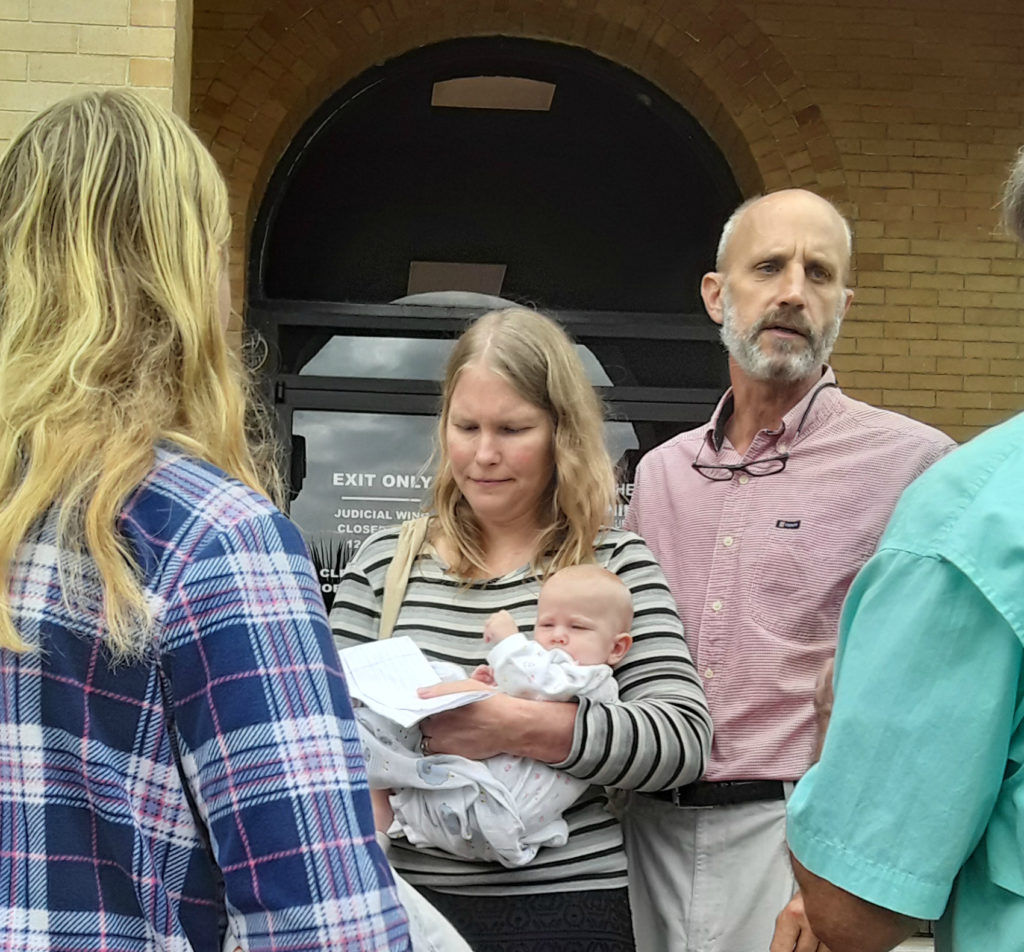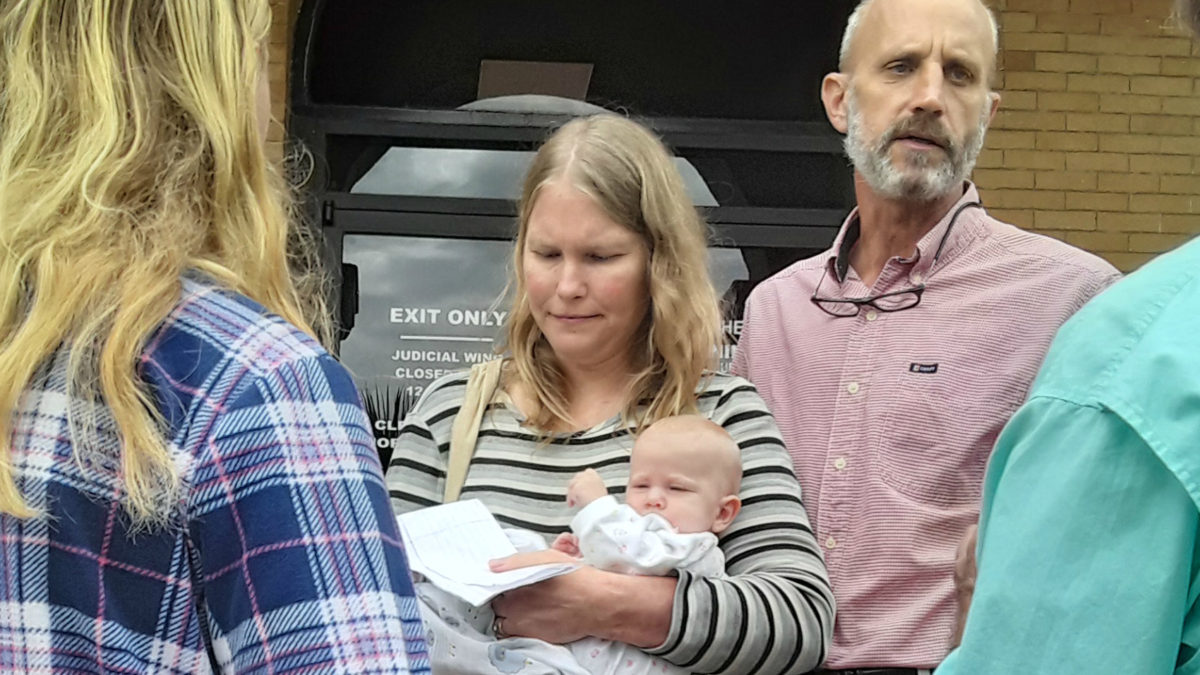


The Department of Control Strikes Again
October 9, 2019Questions to Ask Your Raw Milk Farmer
January 3, 2020

On October 21st and 22nd, Dennis and Alicia Stoltzfoos, owners of Full Circle Farm, went on trial at the Suwannee County Courthouse in Live Oak, Florida. The dairy farmer and his wife were both charged with one criminal misdemeanor for selling food without the proper permit. The couple represented themselves; their three-and-a-half-month-old daughter, Luanna, was at the defense table for much of the trial. Judge William F. Williams found Dennis and Alicia both guilty but deferred sentencing until April 14, 2020. On November 12, the Florida Department of Agriculture and Consumer Services (FDACS) piled on, filing an administrative complaint against the couple, proposing to fine them $3,000 for permitting and labeling violations. The Stoltzfooses have until December 4 to respond to the complaint.
With the way the trial turned out, applying the law to the Stoltzfooses’ situation was on trial as well. There have been a number of “what’s wrong with this picture” moments in the case since the state filed the charges in May, raising the question of why did this case have to go to trial. Dennis attended several pretrial hearings at which most of the cases before the court were for shoplifting along with possession or distribution of crystal meth or opioids; so, in the midst of a group of people charged with causing injury to others or themselves was a farmer and his wife both charged with activity that has made others well.
A trial like the Stoltzfooses’ would usually be held in a misdemeanor court room, but the crowd was too big; so, the trial was moved to a larger courtroom. For most misdemeanor cases, it’s typical to have two or three people present; at the Stoltzfoos trial, it was estimated that close to 100 people, including a number of children, were in the gallery. The first day of the trial, Judge Williams commented, “These kids are so much better behaved than I was at that age. My compliments to the parents of the kids.” The second day of the trial, the judge said, “My parents would have given their right arm for me to behave like that.”
While the state called no witnesses saying the food produced by Full Circle Farm (FCF) had made them sick, Dennis and Alicia submitted into evidence over 100 testimonials from customers on how FCF’s food had benefited their health.
State investigations are usually complaint-driven, but the state investigated the Stoltzfoos operation on its own initiative. There has never been a consumer complaint filed against FCF in all the years it has been in business.
Dennis had a prior run-in with the FDACS in 2005 over selling food without a permit; that case was settled when he agreed to obtain a Master Feed Registration that enabled him to sell pet food. He’s sold raw dairy products and other nutrient-dense foods under the registration [other than aged raw cheese, sales of raw dairy products in Florida are only legal for pet consumption]. Customers place orders on the farm’s website and pick up the orders at various delivery sites around north and west central Florida.
From 2006 until 2018, Dennis renewed the registration then let it lapse a year ago. In January of this year, an undercover agent from FDACS made a “buy” of raw milk and other foods from the farm, leading to criminal and administrative charges against farmer and wife.
Dennis admitted at the trial that he did not have a permit when the undercover officer made the purchase and, going forward, would obtain the permits he needed to be in compliance. He was negotiating with the state’s attorney right up to before the day of the trial to reach a settlement in which the charges would be dropped in return for Dennis obtaining the Master Feed Registration and submitting correct labels for the products he wanted to sell. Just 15 minutes before the trial was to start, the state’s attorney told him he would need to get a food establishment permit to sell at least some of the foods he lists on his website for human consumption as well. What foods the farm would have to sell for human consumption the attorney did not say.
There are a number of small farmers in Florida producing safe, nutritious food that, because of the costly requirements of producing and selling food for human consumption (i.e., installing bathrooms, triple sink, etc.), can only afford to sell their food for pet consumption. Those farmers cannot advertise pet food as being for human consumption but, at the same time, the producers have no legal responsibility to stop their customers from eating pet food. There is high quality human food being sold as pet food and people are seeking it out for their own health and the health of their families.
Dennis was a trailblazer in the 1990s in Florida for promoting the principles of the Weston A. Price Foundation (WAPF) and was one of the first Weston Price chapter leaders in the country. He is an educator and has been operating his farm as a healing ministry for nearly two decades, always looking for ways to produce the healthiest food possible. Dennis used the trial as an opportunity to educate the court on the need for changes in the law such that there would be no government interference with producers benefiting health and decreasing medical expenses through the sale of nutrient-dense food. In addition to introducing the customer testimonials as evidence, Dennis also submitted a copy of Joel Salatin’s book, Everything I Want to Do Is Illegal, to be a part of the court record. Judge Williams admitted the testimonials and the book as evidence, carrying the trial over to a second day so that he would have a chance to read both before rendering his verdict.
After Judge Williams found both defendants guilty, the prosecution asked the judge to sentence the defendants to six months probation, payment of $273 in court costs, and the payment of over $900 to FDACS for the cost of its investigation. The prosecution also asked that the court issue an order prohibiting Full Circle Farm from advertising food on its website and selling food until it obtained the required permits, a possible ‘death sentence’ for the farm given how long the licensing process could take. The judge responded to the state’s request by deferring sentencing for six months so that the Stoltzfooses would have enough time to get the needed permits. The crowd at the trial and the testimonials made the difference in the judge’s decision to defer sentencing.
One of the frustrations Dennis had with the labeling requirements was that his operation was transparent without having to have labels on his products. Customers order only through the farm website so they know what they are purchasing. The couple also has an open-door policy; people can call anytime they have questions or go to the farm to look around. Instead of spending $5,000 per year on labeling, why couldn’t that money go towards further enriching the soil on the farm?
The couple had surveyed its customers on labeling earlier, and the consensus was that the customers didn’t want labeling nor any other regulation. As the globalization of the food supply continues, it’s becoming more apparent that unregulated locally-produced food is safer and more nutritious than regulated food from the industrial food system, especially when that food is coming from countries with food safety systems that are substandard to the one in the U.S. Florida has found out how free ”free trade” is with greening disease, an imported malady that has devastated the state’s citrus industry. FDACS’s time would be better spent on imported food than on investigating farms like Full Circle that have never had a customer complaint. There is significant transparency in the operation of the farm without regulation.
The more local food producers there are in Florida, the safer the state’s food supply will be. Passing a law allowing for more unregulated sales from local producers direct to consumers would be the path towards that goal. It’s time for the legislature to consider doing so.



3 Comments
This isn’t just in Florida. I’m in the Great Lakes area and it’s incredible the harassment that traditional farmers endure.
It’s amazing that the state bureaucrats even have the TIME for this. My state has increasing crime, all sorts of financial problems, they can’t maintain the streets and bridges….yet they have hundreds of full-time bureacrats out to intimidate and arrest farmers.
Here in Oklahoma incidental sales are allowed, but if some lawmaker decides your operation is no longer incidental you can be prosecuted and property seized.
I have friends in Pennsylvania who were being harassed by the department of agriculture on their farm and they had all of their equipment and all of their food taken from them two times they almost went bankrupt they finally had to get a lawyer and they found a farm privacy law in the administrative hearing section 702 Pennsylvania title 2 Statutes Section 504
No adjudication will be valid with a third-party interloper
only by consent of the governed
there’s no authority of the agriculture department on a private farm
people have to agree that their farm is under public law versus private law
Farmers unknowingly applied for a license which puts them under public law and commerce
private-person.com
also there is a privacy pro advocacy group in Texas and they have a private membership association
Originally the department of agriculture was created to protect the farmers and now it is part of the Public government system
there ought to be similar codes and statutes in Florida allowing the farmers to govern their farm in private
so what my friends have now been doing is they only accept cash or a blank postal money order for their goods and services and they never use their name on anything
anyway there’s a whole issue regarding how to be private regarding mail service as well and what address you use etc.